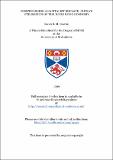Files in this item
Compromising a capitalist enclave: China's utilisation of the Hong Kong economy
Item metadata
| dc.contributor.advisor | Reid, Gavin C. | |
| dc.contributor.author | Beattie, Sarah E. M. | |
| dc.coverage.spatial | 140 p. | en_US |
| dc.date.accessioned | 2018-07-11T13:26:06Z | |
| dc.date.available | 2018-07-11T13:26:06Z | |
| dc.date.issued | 1999 | |
| dc.identifier.uri | https://hdl.handle.net/10023/15253 | |
| dc.description.abstract | This thesis investigates China's use of the Hong Kong economy taking as its framework China's reliance on Hong Kong to act as its international financial centre. China has consistently addressed Hong Kong from the standpoint of Hong Kong's utility to the Chinese economy, from the initiation of China's economic reforms through the negotiations for Hong Kong's sovereignty as well as in the current post-1997 regime as Hong Kong operates under China's auspices. Hong Kong is a vital component of China's own economy because the enclave manages a majority of its trade and investment flows. Hong Kong is able to serve the Mainland precisely because of its international standing as a free-market, capitalist enclave. However, while China will want to keep the territory in its current incarnation (and this intent is signified by the promises of the Basic Law), it is China's involvement in the territory which poses the greatest threat to Hong Kong's status quo. Particularly, Chinese government-owned companies in Hong Kong have characteristics which set them apart from any other type of foreign businesses in the territory. These business interests provide an alternative avenue of power in the territory for the Chinese government, a representation which is susceptible to abuse because of the access it provides to Chinese decision-makers and the Mainland economy. The tension created by the dichotomy between the socialist and capitalist economic systems is vulnerable to exploitation, which could ultimately compromise Hong Kong's economic integrity. The crux of the problem for Hong Kong lies in forging a relationship with its new ruling power which will maintain the territory's independent identity and autonomy, which are crucial to maintaining investor confidence in Hong Kong. Through an analysis of Chinese investment, Hong Kong is shown to be an economy which is increasingly internalised by the mainland. | en_US |
| dc.language.iso | en | en_US |
| dc.publisher | University of St Andrews | |
| dc.subject.lcc | HC470.3B3 | |
| dc.subject.lcsh | Hong Kong (China)--Economic conditions | en |
| dc.title | Compromising a capitalist enclave: China's utilisation of the Hong Kong economy | en_US |
| dc.type | Thesis | en_US |
| dc.contributor.sponsor | Russell Trust | en_US |
| dc.type.qualificationlevel | Masters | en_US |
| dc.type.qualificationname | MPhil Master of Philosophy | en_US |
| dc.publisher.institution | The University of St Andrews | en_US |
This item appears in the following Collection(s)
Items in the St Andrews Research Repository are protected by copyright, with all rights reserved, unless otherwise indicated.

